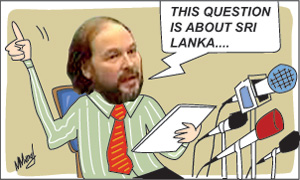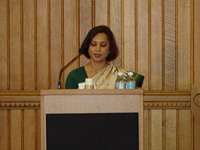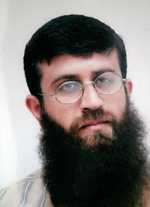Inner City Press' Matthew Russell Lee, who has continued his relentless attacks on the Rajapaksa administration, has gained notoriety for firing pointed questions relating to war crimes charges against Sri Lanka at virtually every UN media conference without missing a beat. As a result, he has not only incurred the wrath of the Sri Lanka Mission in New York but has also been described as "an LTTE agent" in the payroll of Tiger supporters.
Asked for a response, Lee told the Sunday Times in an email message: "The simple answer is no; to say more, it is a form of paranoia to think that any questions or criticism of policies like shelling hospitals and running internment camps can only come from people funded by enemies."
He said the charges remind him of a newspaper in Israel which said that any critics of civilians being killed in Gaza must be with Hamas. "This form of blindness seems to have led to a lack of self-awareness or a lack of awareness of the fact that appointing Shavendra Silva, after he was named in Ban Ki-moon's Panel of Experts report, to a UN advisory post would stir up controversy."
He said, "I also cover the International Monetary Fund's austerity conditions imposed on Sri Lanka, as on Egypt and Greece, and have been approached by and reported on complaints", for example, that Silva spent $100,000 in Sri Lankan funds on a BMW while Sri Lankans' pensions are being cut or not being paid. I intend to continue to follow these stories".
Asked whether his ruthless campaign against the Rajapaksa regime is part of a journalistic odyssey or prompted by a personal grouse, he said: "I have, as a journalist, covered Sri Lanka, mostly the way the United Nations has dealt with the civilian deaths in 2009. I also cover civilian deaths in places like Sudan and Syria, as well as casualties caused by the United States and other Western countries in Somalia, Afghanistan, Pakistan and elsewhere".
Most recently when Major General Shavendra Silva, whose 58th Division is named in Secretary General Ban Ki-moon's report as allegedly engaged in war crimes like shelling hospitals and killing people seeking to surrender, was put forward by Sri Lanka to join the UN Senior Advisory Group (SAG) on Peacekeeping Operations, this struck me as newsworthy.
This nomination was also criticised by other Asia Group ambassadors, by Human Rights High Commissioner Navi Pillay, and by SAG chair Louise Frechette. It was nominating Silva to the SAG which stirred up the recent news here.
Lankan women disappear from Ambassador's residence in Paris
Dayan Jayatilleka, Sri Lanka's Ambassador in France, was in for a rude shock one morning.
Two members of his staff, technically described as "Home Based Service Assistants of H.E. Dr. Dayan Jayatilleka, Ambassador" decamped from his residence in Paris. The reason is not known.
On February 20, the Minister of the Sri Lanka Embassy in Paris shot off an urgent cable to the Secretary, Sri Lanka's Ministry of External Affairs. It was also circulated to Sri Lanka missions and posts in Europe.
The cable describes the Parisian drama. It says, "This is to inform you that Ms. Opatha Kankanamge Dona Manusha Lakmini and Mrs Ruwanpura Nirosha Janaki Jayalath, Home Based Service Assistants of H.E. Dayan Jayatilleka, were found missing at the Residence from the morning hours of 18th February 2012 (Satuday).
"H.E. the Ambassador made a Police complaint in this regard on the same day and action has been taken to cancel the Special Cards issued for them by the French authorities and informed the French Foreign Ministry accordingly. A copy of the Note Verbale sent to the French authorities and a copy of the Police complaint made by H.E. the Ambassador also annexed herewith.
"This mission has cancelled the two official Passports bearing No. OL3639274 and No. OL3639272 which were issued to Ms. Opatha Kankanamge Dona Manusha Lakmini and Mrs Ruwanpura Nirosha Janaki Jayalath respectively and will be despatched in the same by DPL bag.
"Sri Lanka Missions/Posts in Europe are requested to consult either this Mission or the Ministry in the event of Ms. Opatha Kankanamge Dona Manusha Lakmini and Ms. Ruwanpura Nirosha Janaki Jayalath approach for assistance to obtain new travel documents or any other consular assistance."
Tall order for Rajapaksa supporters
During protests held by the UNP outside the Colombo Fort Railway Station, one of the cut-outs of President Mahinda Rajapaksa was damaged.
This week the Federation of the Self-employed decided to replace that cut-out. They came with the President's picture on a canvass, but they found it was about five feet more than the frame and had to return without completing the job.
Our man in Male: Gem of a diplomat
Dixon Dela, Sri Lanka's High Commissioner to the Maldives, was present when the Gem and Jewellery Authority auctioned some 49 plots of land for gem mining in the Kataragama area.
There were reports that he purchased one of the plots. But the envoy quickly denied the claims saying he was in Sri Lanka for medical treatment and had visited Kataragama.
He said that he had decided to visit his friends who had come for the gem auction. But eyewitnesses said he did make some bids. Of course, doing so is not violation of any law or regulation. He has had long time interest in Kataragama.
Indian diplomat treated maid in 'barbaric manner'
Holding a senior Indian diplomat guilty of subjecting her maid to slavery, a US court has ruled that the victim be awarded compensation of $1.5 million, the Times of India reported this week.
The report adds: "The diplomat, Neena Malhotra, was press counsellor with India's consulate in New York and is currently working as director with MEA's southern division in South Block.
"The judge held that the victim, Shanti Gurung, be awarded the money for having suffered "barbaric treatment" at the hands of her employers, Malhotra and her husband Jogesh. The proposed award includes $500,000 for the "emotional distress" inflicted on Gurung by the couple, The New York Post said.
"The ruling by Manhattan federal magistrate Judge Frank Maas, though, is subject to approval by another judge who is overseeing the case. Gurung had come to New York City in 2006 to work as a domestic help, according to court documents."
After Gurung claimed exploitation, the foreign ministry had said media reports on allegations against the senior diplomat "did not appear to be in conformity with facts".
Judge Maas said Gurung, who is now in her early twenties, was a victim of "outrageous and shocking conduct". Her "documents were seized, her travel was restricted, and she was not permitted to telephone her family".
"Significantly, Gurung was also deprived of food, which caused her to lose more than sixty pounds in just over three years and was subjected to physical and mental abuse," Maas said, adding that Gurung's compensation should also include $500,000 as damages for "emotional distress".
According to the court papers, Gurung came to the US at the "behest" of Neena and Jogesh Malhotra and was promised a monthly salary of approximately $108 in exchange for "light cooking, light cleaning, and staffing the occasional house party". However, Gurung's work from the outset was "far more arduous" than the Malhotras had represented it would be.
She was made to work 16 hours a day and in addition to her cooking and cleaning duties, was "required to give Neena Malhotra daily massages, a chore that made her extremely uncomfortable", the court papers said.
US media watchdog attacks NY Times for abusing 'anonymity'
Fairness and Accuracy in Reporting or FAIR is a US-based organization that monitors the US media.
This week it chided one of the leading newspapers in the world - The New York Times - for "allowing anonymous government officials to smear critics as terrorists and terrorist sympathizers -- a shocking violation of the paper's explicit rules against allowing anonymity to be a cover for attacks.
Here is the FAIR account: A story about Khader Adnan--the Palestinian hunger striker challenging the Israeli practice of holding prisoners without trial said:
An Israeli official, speaking on the condition of anonymity, called the deal over Mr. Adnan "a workable arrangement" since ultimately he will be almost completing his four-month term of detention.
"We faced a dilemma," the official said. "On the one hand we did not want any harm to come to him, or the wider danger in that. On the other hand it is not healthy to set a precedent that every time a Palestinian terrorist goes on hunger strike, he gets a get-out-of-jail-free pass."
FAIR noted: The "deal" is a reference to Israel's offer to free Adnan by mid-April. The anonymous Israeli official is declaring Adnan a terrorist. If Israeli officials know this to be the case, they need not detain him without charge; they could bring a case against him under anti-terror laws. So The Times is granting anonymity to a government official to declare Adnan a criminal, despite the lack of any publicly available evidence that this is the case."
Earlier this month, FAIR said, in another story about a new Bureau of Investigative Journalism report about CIA drone strikes targeting rescuers and funerals, The Times granted anonymity to a U.S. official who equated the non-profit news outlet's researchers with Al-Qaeda sympathizers:
"A senior American counterterrorism official, speaking on the condition of anonymity, questioned the report's findings, saying "targeting decisions are the product of intensive intelligence collection and observation." The official added: "One must wonder why an effort that has so carefully gone after terrorists who plot to kill civilians has been subjected to so much misinformation. Let's be under no illusions -- there are a number of elements who would like nothing more than to malign these efforts and help Al-Qaeda succeed."
Both examples FAIR said; clearly violate the paper's stated standards on the granting of anonymity. That privilege is to be used rarely, should be "the subject of energetic negotiation" and should "tell the reader as much as possible about the placement and motivation of the source." The policy also bars granting the cover of anonymity "to people who are engaged in speculation," and states directly: "We do not grant anonymity to people who use it as cover for a personal or partisan attack."
In these cases, FAIR declared, government officials are being granted anonymity to attack individuals critical of those governments' policies. The privilege The Times extends to these powerful figures means they are shielded from any accountability for their words.
Amid diplomatic setbacks, Palihakkara sets examples
At a time when Sri Lanka is on the defensive and being dragged into a political quagmire both in New York and Geneva, there was at least one piece of positive news last week that helped redeem the sullied image of the hapless country.
H.M.G.S. Palihakkara, a distinguished career diplomat and former Foreign Secretary, came out admirably well as the new chairman of Secretary-General Ban Ki-moon's Advisory Board on Disarmament Matters during its session in New York last week.
The Advisory Board, whose 15 members serve two year terms, is chosen by the Secretary-General for their "knowledge and experience in the field of disarmament and international security."
And the members paid Palihakkara the highest political compliment by choosing him to chair the Advisory Board which holds two sessions every year, alternating between New York and Geneva.
Walking on a tightrope with bucket on the head
Representing a country facing war crimes charges, a tainted judiciary and the absence of rule of law and a free press, Sri Lankan envoys in overseas missions have an extremely hard time defending a government they represent -- particularly in Geneva, New York, London and Washington DC.
When a former senior career diplomat was offered one of these postings a couple of years ago, he famously told a Sri Lankan journalist: Being an ambassador (under the present administration) is like walking on a tightrope with a bucket of s**t on your head. Coincidentally, that remark was made when the United Nations was commemorating the "International Year of Sanitation.
|





